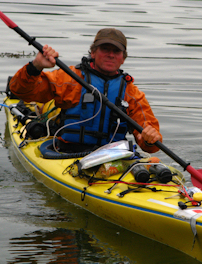 Jasper Winn grew up in West Cork, where he left school at age ten and educated himself by reading, riding horses, learning rural skills and playing music. It was an upbringing that has shaped a lifetime of travel and writing. He has journeyed across the Atlas with nomadic Berbers, canoed along the Danube, and often crosses countries on horseback. He was story consultant on the IMAX film, Ride Around the World, about the world’s horse cultures. Paddle is his first book.
Jasper Winn grew up in West Cork, where he left school at age ten and educated himself by reading, riding horses, learning rural skills and playing music. It was an upbringing that has shaped a lifetime of travel and writing. He has journeyed across the Atlas with nomadic Berbers, canoed along the Danube, and often crosses countries on horseback. He was story consultant on the IMAX film, Ride Around the World, about the world’s horse cultures. Paddle is his first book.
Last summer, writer and musician, Jasper Winn set himself an extraordinary task. He would kayak the whole way round Ireland – a thousand miles – camping on remote headlands and islands, carousing in bars and paddling clockwise until he got back where he started. But in the worst Irish summer in living memory the pleasures of idling among seals, fulmars and fishing boats soon gave way to heroic struggles through storm-tossed seas … and lock-ins playing music in coastal pubs.
Circling the country where he grew up, Jasper reflects on life at the very fringes of Ireland, the nature and lore of its seas, and his own eccentric upbringing – sprung from school at age ten and left free to explore the countryside and its traditional life. Charming, quietly epic, and with an irresistible undertow of wit, Paddle is a low-tech adventure that captures the sheer joy of a misty morning on Ireland’s coast.
Web Site: www.jasperwinn.com
Details of this year’s festival programme can be found elsewhere on this website.



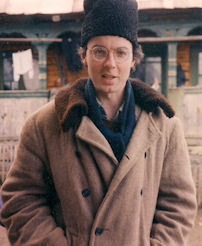 William Blacker lived in Romania from 1996 to 2004. He now divides his time between England, Italy and Romania. He has contributed articles and photographs to the Daily Telegraph, Ecologist, Art Newspaper and The Times.
William Blacker lived in Romania from 1996 to 2004. He now divides his time between England, Italy and Romania. He has contributed articles and photographs to the Daily Telegraph, Ecologist, Art Newspaper and The Times. Alex von Tunzelmann’s Red Heat was published in April 2011. It is a history of the Cold War in the Caribbean, focused around the Cuban Missile Crisis, the Castros and the Kennedys. Her first book, Indian Summer, was published in 2007. William Dalrymple called it “Unquestionably the best book I have ever read on the independence and partition of India and Pakistan, and pretty close to a flat-out masterpiece.” It is in development as a feature film by Working Title Productions. Alex writes regular travel pieces for Lonely Planet Magazine, where her assignments have ranged from a quest for a crystal skull in Belize to following the dogsled tracks of early explorers in the high Arctic. She has a weekly column for The Guardian Online about the real story behind historical movies.
Alex von Tunzelmann’s Red Heat was published in April 2011. It is a history of the Cold War in the Caribbean, focused around the Cuban Missile Crisis, the Castros and the Kennedys. Her first book, Indian Summer, was published in 2007. William Dalrymple called it “Unquestionably the best book I have ever read on the independence and partition of India and Pakistan, and pretty close to a flat-out masterpiece.” It is in development as a feature film by Working Title Productions. Alex writes regular travel pieces for Lonely Planet Magazine, where her assignments have ranged from a quest for a crystal skull in Belize to following the dogsled tracks of early explorers in the high Arctic. She has a weekly column for The Guardian Online about the real story behind historical movies.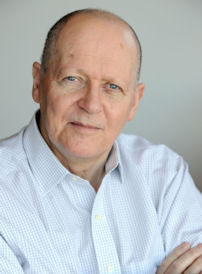 Born in Belfast and educated at Queen’s University Belfast, Conor O’Clery worked for The Irish Times, Ireland’s leading national newspaper, for over 30 years in various positions, including staff correspondent based in London, Moscow, Washington, D.C., Beijing and New York City. He wrote for The New Republic from Moscow, contributed columns to Newsweek International, and has been a frequent commentator on BBC, NPR and CNN. He was won several awards, including “Journalist of the Year” twice in Ireland: first in 1987 for his reporting of the Soviet Union, and, secondly, in 2002 for his reporting of the 9/11 attacks on the World Trade Center, which he witnessed from his office three blocks away. O’Clery has written a number of books on American, Russian and Irish politics, including an account of his world reporting called May You Live in Interesting Times. His latest book, Moscow, December 25, 1991/ The Last Day of the Soviet Union, will be published in August by Public Affairs in the U.S. and Transworld in the U.K. He is currently Ireland correspondent for GlobalPost, a foreign news website in the U.S. He resides in Dublin with his Russian-born Armenian wife, Zhanna.
Born in Belfast and educated at Queen’s University Belfast, Conor O’Clery worked for The Irish Times, Ireland’s leading national newspaper, for over 30 years in various positions, including staff correspondent based in London, Moscow, Washington, D.C., Beijing and New York City. He wrote for The New Republic from Moscow, contributed columns to Newsweek International, and has been a frequent commentator on BBC, NPR and CNN. He was won several awards, including “Journalist of the Year” twice in Ireland: first in 1987 for his reporting of the Soviet Union, and, secondly, in 2002 for his reporting of the 9/11 attacks on the World Trade Center, which he witnessed from his office three blocks away. O’Clery has written a number of books on American, Russian and Irish politics, including an account of his world reporting called May You Live in Interesting Times. His latest book, Moscow, December 25, 1991/ The Last Day of the Soviet Union, will be published in August by Public Affairs in the U.S. and Transworld in the U.K. He is currently Ireland correspondent for GlobalPost, a foreign news website in the U.S. He resides in Dublin with his Russian-born Armenian wife, Zhanna.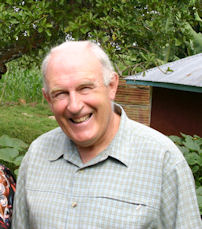 Frank Reidy is a former army commandant. During his 25 years in the Defence Forces, he was stationed in the Curragh in Kildare as head of the Audio Visual Unit, where he lectured on Media Studies in the Military College. He spent periods in both the Middle East and in Rwanda. On his retirement, he spent some time working with RTÉ as a reporter and researcher. He returned to Rwanda in 2000, working for Refugee Trust International. He regularly returns to Africa, travelling and as a voluntary worker. His first book, Ó Chósta go Cósta, which was published by Cló Iar-Chonnachta in 2009, is based on his travels in east Africa. Ó Chósta go Cósta won the prestigious the Irish language book of the year award – Gradam Uí Shiúilleabháin – in 2010. Frank was born in Sligo and he lives in Ros a’ Mhíl, Co Galway. He is a regular contributor to both Raidió na Gaeltachta and TG4 on both defence and international issues. Frank is currently researching for a new book on Ethiopia.
Frank Reidy is a former army commandant. During his 25 years in the Defence Forces, he was stationed in the Curragh in Kildare as head of the Audio Visual Unit, where he lectured on Media Studies in the Military College. He spent periods in both the Middle East and in Rwanda. On his retirement, he spent some time working with RTÉ as a reporter and researcher. He returned to Rwanda in 2000, working for Refugee Trust International. He regularly returns to Africa, travelling and as a voluntary worker. His first book, Ó Chósta go Cósta, which was published by Cló Iar-Chonnachta in 2009, is based on his travels in east Africa. Ó Chósta go Cósta won the prestigious the Irish language book of the year award – Gradam Uí Shiúilleabháin – in 2010. Frank was born in Sligo and he lives in Ros a’ Mhíl, Co Galway. He is a regular contributor to both Raidió na Gaeltachta and TG4 on both defence and international issues. Frank is currently researching for a new book on Ethiopia.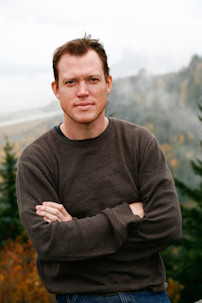 Rolf Potts has reported from more than sixty countries for the likes of National Geographic Traveler, the New York Times Magazine, Slate.com, Conde Nast Traveler, Outside, The Guardian, American Public Radio, and the Travel Channel. His adventures have taken him across six continents, and include piloting a fishing boat 900 miles down the Laotian Mekong, hitchhiking across Eastern Europe, traversing Israel on foot, bicycling across Burma, driving a Land Rover across South America, and (most recently) traveling around the world for six weeks with no luggage or bags of any kind.
Rolf Potts has reported from more than sixty countries for the likes of National Geographic Traveler, the New York Times Magazine, Slate.com, Conde Nast Traveler, Outside, The Guardian, American Public Radio, and the Travel Channel. His adventures have taken him across six continents, and include piloting a fishing boat 900 miles down the Laotian Mekong, hitchhiking across Eastern Europe, traversing Israel on foot, bicycling across Burma, driving a Land Rover across South America, and (most recently) traveling around the world for six weeks with no luggage or bags of any kind.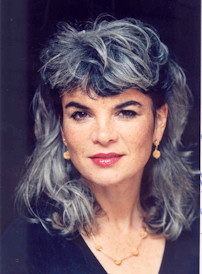 Sara Wheeler was brought up in Bristol. She read Classics and Modern Languages at Oxford University before embarking on polar explorations. A traveller, journalist and broadcaster, she lives in London with her partner and young son. She is the author of six previous books, including Terra Incognita: Travels in Antarctica, Cherry: A Life of Apsley Cherry-Garrard, Too Close to the Sun: The Life and Times of Denys Finch Hatton and The Magnetic North.
Sara Wheeler was brought up in Bristol. She read Classics and Modern Languages at Oxford University before embarking on polar explorations. A traveller, journalist and broadcaster, she lives in London with her partner and young son. She is the author of six previous books, including Terra Incognita: Travels in Antarctica, Cherry: A Life of Apsley Cherry-Garrard, Too Close to the Sun: The Life and Times of Denys Finch Hatton and The Magnetic North.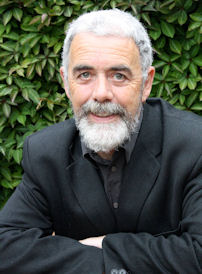 Theo Dorgan was born in Cork in 1953, and now makes his home in Dublin. He is a poet, prose writer, translator, editor and broadcaster. His most recent collection of poems, GREEK, was published in 2010 by Dedalus Press.
Theo Dorgan was born in Cork in 1953, and now makes his home in Dublin. He is a poet, prose writer, translator, editor and broadcaster. His most recent collection of poems, GREEK, was published in 2010 by Dedalus Press.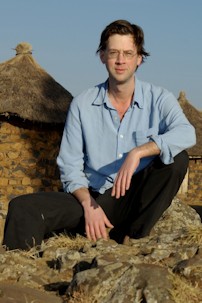 Manchán Magan is a writer and documentary-maker. He wrote the Magan’s World travel column for Saturday’s Irish Times Magazine for 6 years and currently hosts the Right Hook travel slot. His travel documentaries focusing on issues of world culture for TG4, RTE & Travel Channel were shown in 25 territories around the world. No Béarla, his documentary series about travelling around Ireland speaking only Irish sparked international debate. He has written numerous travel books in English and Irish, including, include ‘Angels & Rabies: a journey through the Americas’ (Brandon, 2006), ‘Manchán’s Travels: a journey through India’ (Brandon, 2007) and ‘Truck Fever: a journey through Africa’ (Brandon, 2008). His Irish books include Baba-ji agus TnaG (Coiscéim 2006) and Manchán ar Seachrán (Coiscéim 1998). He has written for the Guardian, LA Times and Washington Post.
Manchán Magan is a writer and documentary-maker. He wrote the Magan’s World travel column for Saturday’s Irish Times Magazine for 6 years and currently hosts the Right Hook travel slot. His travel documentaries focusing on issues of world culture for TG4, RTE & Travel Channel were shown in 25 territories around the world. No Béarla, his documentary series about travelling around Ireland speaking only Irish sparked international debate. He has written numerous travel books in English and Irish, including, include ‘Angels & Rabies: a journey through the Americas’ (Brandon, 2006), ‘Manchán’s Travels: a journey through India’ (Brandon, 2007) and ‘Truck Fever: a journey through Africa’ (Brandon, 2008). His Irish books include Baba-ji agus TnaG (Coiscéim 2006) and Manchán ar Seachrán (Coiscéim 1998). He has written for the Guardian, LA Times and Washington Post.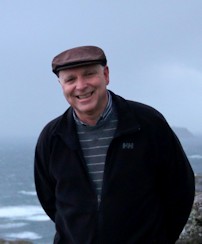 Paul Clements is the author of four travel books about Ireland, as well as works of biography and criticism, and is a contributing writer to three guidebooks to Ireland. His latest book, Wandering Ireland’s Wild Atlantic Way: From Banba’s Crown to World’s End (2016) is based on a journey along the west coast by car and bike, on horseback and on foot. Burren Country: Travels through an Irish limestone landscape is a collection of essays described as a love letter to the Burren published in 2011 by the Collins Press. The Height of Nonsense: The Ultimate Irish Road Trip (2005) and Irish Shores, A Journey Round the Rim of Ireland (1993) have both been reprinted in 2016. Paul’s acclaimed biography on the travel writer, actor and singer Richard Hayward, Romancing Ireland, was published in 2014 by Lilliput Press and adapted for BBC television. He has written and edited two books about the travel writer and historian Jan Morris. In 2012, he edited an anthology The Blue Sky Bends Overall, a celebration of ten years of the Immrama Festival of Travel Writing. A regular contributor to The Irish Times, he has written many ‘Irishman’s Diaries’ on cultural life and heritage, and reviews Irish local history books.
Paul Clements is the author of four travel books about Ireland, as well as works of biography and criticism, and is a contributing writer to three guidebooks to Ireland. His latest book, Wandering Ireland’s Wild Atlantic Way: From Banba’s Crown to World’s End (2016) is based on a journey along the west coast by car and bike, on horseback and on foot. Burren Country: Travels through an Irish limestone landscape is a collection of essays described as a love letter to the Burren published in 2011 by the Collins Press. The Height of Nonsense: The Ultimate Irish Road Trip (2005) and Irish Shores, A Journey Round the Rim of Ireland (1993) have both been reprinted in 2016. Paul’s acclaimed biography on the travel writer, actor and singer Richard Hayward, Romancing Ireland, was published in 2014 by Lilliput Press and adapted for BBC television. He has written and edited two books about the travel writer and historian Jan Morris. In 2012, he edited an anthology The Blue Sky Bends Overall, a celebration of ten years of the Immrama Festival of Travel Writing. A regular contributor to The Irish Times, he has written many ‘Irishman’s Diaries’ on cultural life and heritage, and reviews Irish local history books.